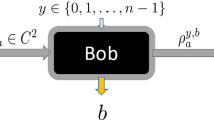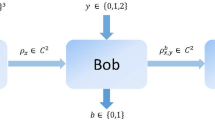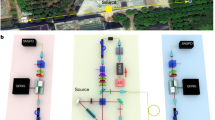Abstract
The non-classical correlations presented in quantum random access code experiment are a powerful diagnostic tool for semi-device-independent random number generator protocols. The idea behind it is that if the user observes the optimal non-classical correlations, he has the guarantee that the unknown quantum states and measurements in the devices have carefully calibrated (we say have global reference frame), in a relationship which can bring to random outcomes. This means, for observing the non-classical correlations, the devices must have that calibration in previous. However, that calibration can’t always be guaranteed in reality due to unintentional flaws or failures of the quantum apparatuses, thus the devices do not always occur the wanted non-classical correlations. In this paper, we show there will always have non-classical correlations by the proper operations, when the devices have local reference. The quantity of true randomness in the observed non-classical correlations is then quantified by the violation values of some inequality. Besides we also consider the devices without local reference and show the probability of non-classical correlations occurring in 100 trials.



Similar content being viewed by others
Explore related subjects
Discover the latest articles, news and stories from top researchers in related subjects.Notes
Alice has three vectors \(l_{1},l_{2},l_{3}\) and Bob has three vectors \(a_{1},a_{2},a_{3}\). Alice and Bob each choose two vectors can form an inequality like Eq. (7). A total of nine CHSH-like inequalities are formed.
References
Brunner, N., Pironio, S., Acín, A.: Testing the dimension of Hilbert spaces. Phys. Rev. Lett. 100, 210503 (2008)
Wehner, S., Christandl, M., Doherty, A.C.: Lower bound on the dimension of a quantum system given measured data. Phys. Rev. A 78, 062112 (2008)
Ambainis, A., Nayak, A., Ta-Shma, A.: Dense quantum coding and quantum finite automata. J. ACM 49, 496–511 (2002)
Ambainis, A., Leung, D., Mancinska, L., et al.: Quantum random access codes with shared randomness. arXiv: 0810.2937 (2008)
Hayashi, M., Iwama, K., Nishimura, H.: (4, 1) Quantum random access coding does not exist-one qubit is not enough to recover one of four bits. N. J. Phys. 8, 129 (2006)
Chaturvedi, A., Pawłowski, M., Horodecki, K.: Random access codes and nonlocal resources. Phys. Rev. A 96(2), 022125 (2017)
Pawłowski, M., Źukowski, M.: Entanglement-assisted random access codes. Phys. Rev. A 81, 042326 (2010)
Dall’Arno, M., Passaro, E., Gallego, R., Acín, A.: Robustness of device-independent dimension witnesses. Phys. Rev. A 86(4), 042312 (2012)
Gallego, R., Brunner, N., Hadley, C., Acín, A.: Device-independent tests of classical and quantum dimensions. Phys. Rev. Lett. 105(23), 230501 (2010)
Li, H.W., Yin, Z.Q., Wu, Y.C., et al.: Semi-device-independent random-number expansion without entanglement. Phys. Rev. A 84, 034301 (2011)
Mironowicz, P., Li, H.W., Pawłowski, M.: Properties of dimension witnesses and their semidefinite programming relaxations. Phys. Rev. A 90, 022322 (2014)
Li, H.W., Pawłowski, M., Yin, Z.Q., et al.: Semi-device-independent randomness certification using n\(\rightarrow \)1 quantum random access codes. Phys. Rev. A 85, 052308 (2012)
Wang, Y.K., Qin, S.J., Song, T.T., et al.: Effects of relaxed assumptions on semi-device-independent randomness expansion. Phys. Rev. A 89, 032312 (2014)
Wang, Y.K., Qin, S.J., Wu, X., Gao, F., Wen, Q.Y.: Reduced gap between observed and certified randomness for semi-device-independent protocols. Phys. Rev. A 92, 052321 (2015)
Li, H.W., Mironowicz, P., Pawłowski, M., et al.: Relationship between semi-and fully-device-independent protocols. Phys. Rev. A 87, 020302 (2013)
Bartlett, S.D., Rudolph, T., Spekkens, R.W.: Reference frames, superselection rules, and quantum information. Rev. Mod. Phys. 79, 555 (2007)
Costa, F., Harrigan, N., Rudolph, T., Brukner, C.: Entanglement detection with bounded reference frames. N. J. Phys. 11(12), 123007 (2009)
Shadbolt, P., et al.: Guaranteed violation of a Bell inequality without aligned reference frames or calibrated devices. Sci. Rep. 2, 470 (2012)
Mayers, D., Yao, A.C.C.: Proceedings of the 39th Annual Symposium on Foundations of Computer Science, pp. 503–509 (1998)
Clauser, J.F., Horne, M.A., Shimony, A., et al.: Proposed experiment to test local hidden-variable theories. Phys. Rev. Lett. 23, 880884 (1969)
Acknowledgements
This work is supported by National Natural Science Foundation of China (Grant Nos. 61672110 and 61671082).
Author information
Authors and Affiliations
Corresponding author
Rights and permissions
About this article
Cite this article
Qin, SJ., Wang, YK., Li, RZ. et al. The randomness in 2\(\rightarrow \)1 quantum random access code without a shared reference frame. Quantum Inf Process 17, 276 (2018). https://doi.org/10.1007/s11128-018-2040-5
Received:
Accepted:
Published:
DOI: https://doi.org/10.1007/s11128-018-2040-5




